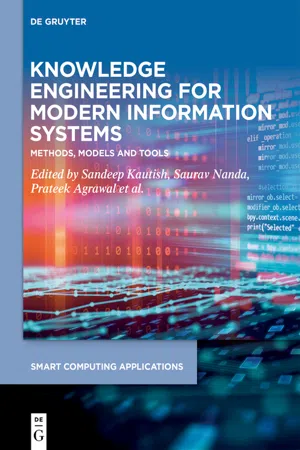
Knowledge Engineering for Modern Information Systems
Methods, Models and Tools
Anand Sharma, Sandeep Kautish, Prateek Agrawal, Vishu Madaan, Charu Gupta, Saurav Nanda, Anand Sharma, Sandeep Kautish, Prateek Agrawal, Vishu Madaan, Charu Gupta, Saurav Nanda
- 238 pagine
- English
- ePUB (disponibile sull'app)
- Disponibile su iOS e Android
Knowledge Engineering for Modern Information Systems
Methods, Models and Tools
Anand Sharma, Sandeep Kautish, Prateek Agrawal, Vishu Madaan, Charu Gupta, Saurav Nanda, Anand Sharma, Sandeep Kautish, Prateek Agrawal, Vishu Madaan, Charu Gupta, Saurav Nanda
Informazioni sul libro
Knowledge Engineering (KE) is a field within artificial intelligence that develops knowledgebased systems. KE is the process of imitating how a human expert in a specific domain would act and take decisions. It contains large amounts of knowledge, like metadata and information about a data object that describes characteristics such as content, quality, and format, structure and processes. Such systems are computer programs that are the basis of how a decision is made or a conclusion is reached. It is having all the rules and reasoning mechanisms to provide solutions to real-world problems. This book presents an extensive collection of the recent findings and innovative research in the information system and KE domain. Highlighting the challenges and difficulties in implementing these approaches, this book is a critical reference source for academicians, professionals, engineers, technology designers, analysts, undergraduate and postgraduate students in computing science and related disciplines such as Information systems, Knowledge Engineering, Intelligent Systems, Artifi cial Intelligence, Cognitive Neuro - science, and Robotics. In addition, anyone who is interested or involved in sophisticated information systems and knowledge engineering developments will find this book a valuable source of ideas and guidance.
Domande frequenti
Informazioni
Prototyping the expectancy disconfirmation theory model for quality service delivery in federal university libraries in Nigeria
Abstract
1 Introduction
Indice dei contenuti
- Title Page
- Copyright
- Contents
- Knowledge engineering for industrial expert systems
- Machine learning integrated blockchain model for Industry 4.0 smart applications
- Prototyping the expectancy disconfirmation theory model for quality service delivery in federal university libraries in Nigeria
- Design of chatbot using natural language processing
- Algorithm development based on an integrated approach for identifying cause and effect relationships between different factors
- Risk analysis and management in projects
- Assessing and managing risks in smart computing applications
- COVID-19 visualization and exploratory data analysis
- Business intelligence and decision support systems: business applications in the modern information system era
- Business intelligence implementation in different organizational setup evidence from reviewed literatures
- Conceptualization of a modern digital-driven health-care management information system (HMIS)
- Knowledge engine for a Hindi text-to-scene generation system
- Index